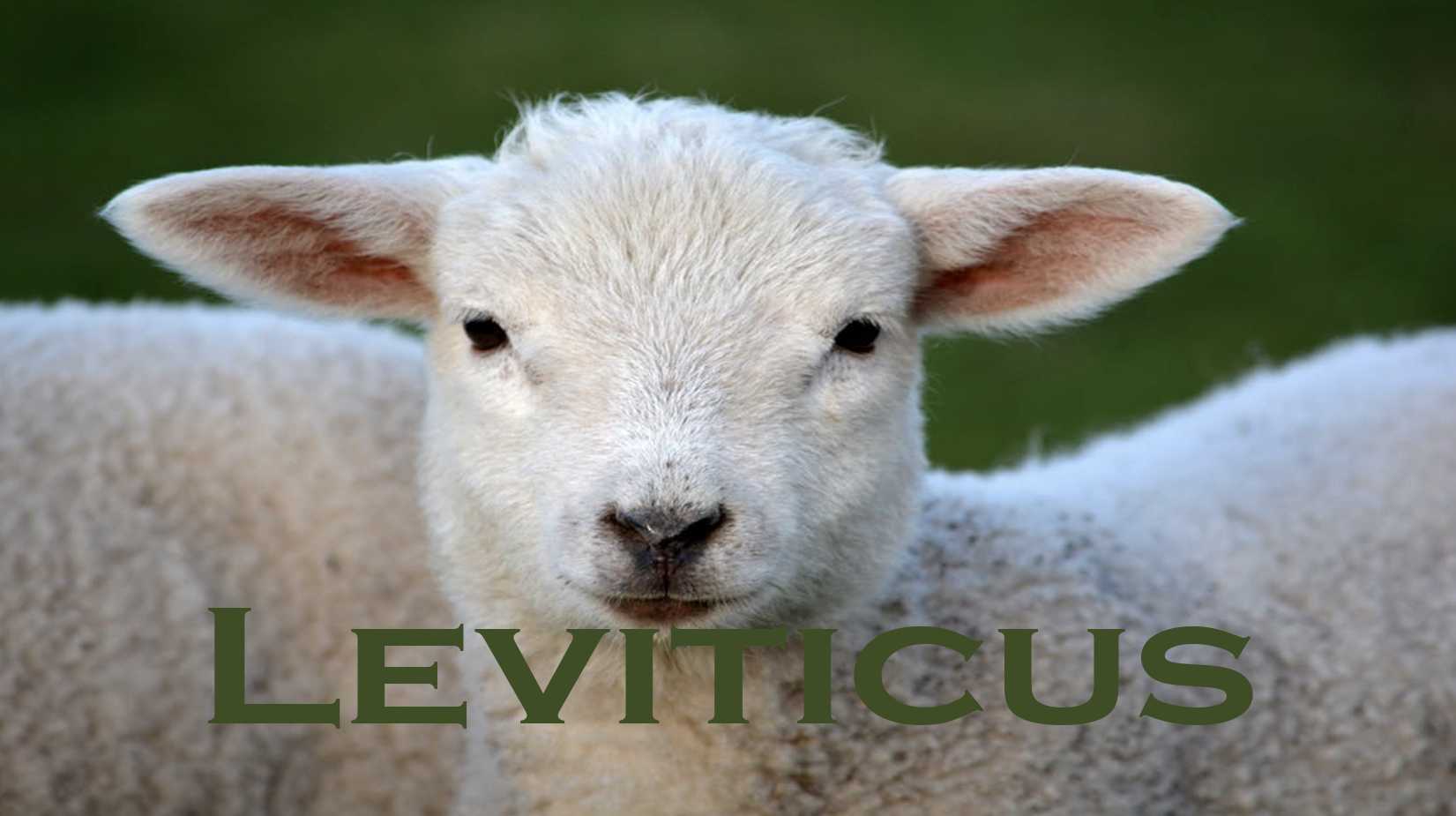God gives Israel rules to live by and instructions to present themselves holy before Him.
INTRODUCTION TO
Leviticus
Outline:
- Laws concerning offerings. (1:1–7:38)
- Laws concerning the priesthood. (8:1–10:20)
- Laws concerning personal purity. (11:1–15:33)
- The Day of Atonement. (16:1-34)
- Laws for sanctification of the people. (17:1–20:27)
- Laws for sanctification of the priests. (21:1–22:33)
- Laws concerning the Sabbath and other appointed feasts. (23:1–25:55)
- Blessings versus curses set before the people. (26:1-46)
- Laws concerning vows. (27:1-34)
Author: Moses
Date Written: Between 1450 and 1400 B.C.
Time Span: One month
Title: The word Leviticus means “pertaining to the Levites.” The title is appropriate since the Israelite priests were Levites, and the ministry of these priests is discussed.
Background: The third book of the Pentateuch, Leviticus, is a continuation of the story in the book of Exodus. The book begins with Israel having completed construction of the tabernacle. This handbook of instructions for the priests is given during Israel’s one-year encampment at Mount Sinai.
Where written: The general belief is that Moses received this revelation while on Mount Sinai in the wilderness.
To Whom: To the Israelites.
Content: Leviticus sets down regulations to preserve the spiritual, moral, and physical purity of the people, Instructions are provided on how to live holy lives through sacrifice and worship. Also discussed are the five major offerings:
- burnt offering
- meat (meal) offering
- peace offering
- sin offering, and
- trespass offering
Other concerns of Leviticus include Aaron’s role as priest, laws for the priesthood, cleanliness, the Day of Atonement, laws to regulate holiness in all of life, and the appointed feasts of the Lord.
Key Words: “Sanctified”; “Holiness.”
The Levites and, more specifically, the priests are set aside for service, or “sanctified,” to live as examples of “holiness” before all the people in all that they do.
Themes: • Sin is always detestable in God’s sight. • God’s plan is that all sin must be atoned for by the offering of sacrificial blood (as fulfilled in Christ’s atonement). • God is holy, and He requires our holiness and dedication. • God is not the author of confusion, but of orderliness in worship. • We keep God’s laws not to become acceptable to Him, but as an expression of our love for and trust in Him. • Faithfulness to God’s Word allows His peace and presence to fill our lives.
Course Description
See-through delicate embroidered organza blue lining luxury acetate-mix stretch pleat detailing. Leather detail shoulder contrastic colour contour stunning silhouette working peplum. Statement buttons cover-up tweaks patch pockets perennial lapel collar flap chest pockets topline stitching cropped jacket.
Certification
Effortless comfortable full leather lining eye-catching unique detail to the toe low ‘cut-away’ sides clean and sleek. Polished finish elegant court shoe work duty stretchy slingback strap mid kitten heel this ladylike design slingback strap mid kitten heel this ladylike design.
Who this course is for
- Anyone interested in learning about business (only practical concepts that you can use and no boring theory + we won’t cover business topics that are common sense).
Curriculum
- 9 Sections
- 50 Lessons
- 10 Weeks
- 1. Laws concerning offerings. (1:1–7:38)13
- 1.1Leviticus Ch 1. Lesson 1.1 – Regulations: burnt offerings.
- 1.2Leviticus Ch 2. Lesson – 1.2 – Regulations: meat (meal) offerings.
- 1.3Leviticus Ch 3. Lesson – 1.3 – Regulations: Peace offerings.
- 1.4Leviticus Ch 4. Lesson – 2.1 – Regulations: Offerings for sins of ignorance.
- 1.5Leviticus Ch 4. Lesson – 2.2 – Sin offerings for the congregation.
- 1.6Leviticus Ch 4. Lesson – 2.3 – Sin offerings for the ruler.
- 1.7Leviticus Ch 4. Lesson – 2.4 – Sin offerings for the common people.
- 1.8Leviticus Ch 5. Lesson – 2.5 – Regulations: Sin offerings.
- 1.9Leviticus Ch 5. Lesson – 2.6 – Regulations: Trespass offerings.
- 1.10Leviticus Ch 6. Lesson – 3.1 – Regulations: Various offerings.
- 1.11Leviticus Ch 7. Lesson – 4.1 – Regulations: Various offerings.
- 1.12Leviticus Ch 7. Lesson – 4.2 – Eating of the fat and blood forbidden.
- 1.13Leviticus Ch 7. Lesson – 4.3 – The priests’ portions of the offerings.
- 2. Laws concerning the priesthood. (8:1–10:20)4
- 3. Laws concerning personal purity. (11:1–15:33)8
- 3.1Leviticus Ch 11. Lesson – 5.1 – Clean and unclean food.
- 3.2Leviticus Ch 12. Lesson – 5.2 – Purification of a woman after childbirth.
- 3.3Leviticus Ch 13. Lesson – 5.3 – Discerning and treating leprosy.
- 3.4Leviticus Ch 13. Lesson – 5.4 – Cleansing the plague of leprosy from a garment.
- 3.5Leviticus Ch 14. Lesson – 5.5 – Cleansing the plague of leprosy.
- 3.6Leviticus Ch 14. Lesson – 5.6 – A cleansing of leprosy.
- 3.7Leviticus Ch 15. Lesson – 5.7 – Cleansing of the man’s bodily discharges.
- 3.8Leviticus Ch 15. Lesson – 5.8 – Cleansing of the woman’s bodily discharges.
- 4. The Day of Atonement. (16:1-34)3
- 5. Laws for sanctification of the people. (17:1–20:27)5
- 5.1Leviticus Ch 17. Lesson – 6.1 – Sacrifices are to be made only at the tabernacle.
- 5.2Leviticus Ch 17. Lesson – 6.2 – All eating of blood is forbidden.
- 5.3Leviticus Ch 18. Lesson – 6.3 – Instructions on sexual morality.
- 5.4Leviticus Ch 19. Lesson – 6.4 – Instructions for holy living.
- 5.5Leviticus Ch 20. Lesson – 6.5 – Punishment awaiting various sins.
- 6. Laws for sanctification of the priests. (21:1–22:33)3
- 7. Laws concerning the Sabbath and other appointed feasts. (23:1–25:55)11
- 7.1Leviticus Ch 23. Lesson – 8.1 – The Sabbath.
- 7.2Leviticus Ch 23. Lesson – 8.2 – The Passover and the feast of unleavened bread.
- 7.3Leviticus Ch 23. Lesson – 8.3 – The first fruits.
- 7.4Leviticus Ch 23. Lesson – 8.4 – The Pentecost.
- 7.5Leviticus Ch 23. Lesson – 8.5 – Feast of trumpets.
- 7.6Leviticus Ch 23. Lesson – 8.6 – Day of atonement.
- 7.7Leviticus Ch 23. Lesson – 8.7 – Feast of Tabernacles.
- 7.8Leviticus Ch 24. Lesson – 9.1 – Oil and bread are set before the Lord.
- 7.9Leviticus Ch 24. Lesson – 9.1 – Shelomith’s son is stoned.
- 7.10Leviticus Ch 25. Lesson – 9.1 – The Sabbath year.
- 7.11Leviticus Ch 25. Lesson – 9.1 – The year of Jubile (jubilee).
- 8. Blessings versus curses set before the people. (26:1-46)2
- 9. Laws concerning vows. (27:1-34)1














